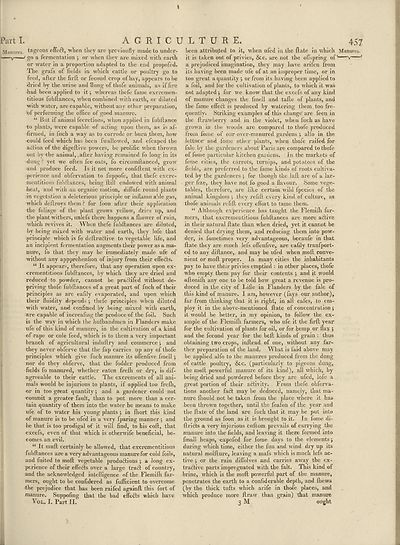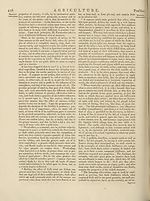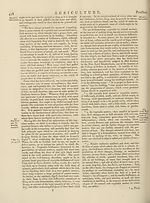Encyclopaedia Britannica, or, a Dictionary of arts, sciences, and miscellaneous literature : enlarged and improved. Illustrated with nearly six hundred engravings > Volume 1, A-AME
(485) Page 457
Download files
Complete book:
Individual page:
Thumbnail gallery: Grid view | List view

I
Part I.
Manures, tageous effeft, when they are previoufly made to under-
i—v——' go a fermentation ; or when they are mixed with earth
or water in a proportion adapted to the end propofed.
The grafs of fields in which cattle or poultry go to
feed, after the firlt or fecond crop of hay, appears to be
dried by the urine and dung of thofe animals, as if lire
had been applied to it j whereas thefe fame excremen-
titious iubllances, when combined with earth, or diluted
with water, are capable, without any other preparation,
of performing the office of good manure.
“ But if animal fecretions, when applied in fubilance
to plants, were capable of acting upon them, as is af¬
firmed, in fuch a way as to corrode or burn .them, how
could feed which has been fwallowed, and efcaped the
action of the digeftive powers, be prolific when thrown
out by-the animal, ^after having remained fo long in its
dung ? yet we often fee oats, fo circumltanced, grow
and produce feed. Is it not more conliftent with ex¬
perience and obfervation to fuppofe, that thefe excre-
mentitious fubftances, being ftill endowed with animal
heat, and with an organic motion, diffufe round plants
in vegetation a deleterious principle or inllamn able gas,
which deftroys them ? for foon after their application
the foliage of the plant grows yellow, dries up, and
the plant withers, unlefs there happens a lliower of rain,
which revives it. When thefe fubftances are diluted,
by being mixed with water and earth, they lofe that
principle which is fo deftrudtive to vegetable life, and
an incipient fermentation augments their power as a ma¬
nure, fo that they may be immediately made ufe of
without any appprehenlion of injury from their effects,
“ It appears, therefore, that any operation upon ex-
crementitious fubftances, by which they are dried and
reduced to powder, cannot be pradifed without de¬
priving thofe fubftances of a great part of fuch of their
principles as are eafily evaporated, and upon which
their fluidity depends \ thefe principles when diluted
with water, and confined by being mixed with earth,
are capable of increafing the produce of the foil. Such
is the way in which the hufbandmen in Flanders make
ufe of this kind of manure, in the cultivation of a kind
of rape or cole leed, which is to them a very important
branch of agricultural induftry and commerce} and
they never obferve that the fap carries up any of thofe
principles which give fuch manure its offenfive fmell ;
nor do they obferve, that the fodder produced from
fields fo manured, whether eaten frelh or dry, is dif-
agreeable to their cattle. The excrements of all ani¬
mals would be injurious to plants, if applied too freffi,
or in too great quantity; and a gardener could not
commit a greater fault, than to put more than a cer¬
tain quantity of them into the water he means to make
ufe of to water his young plants ; in fhort this kind
of manure is to be ufed in a very fparing manner ; and
he that is too prodigal of it will find, to his coft, that
excefs, even of that which is otherwife beneficial, be¬
comes an evil.
“ It muft certainly be allowed, that exerementitious
fubftances are a very advantageous manure for cold foils,
and fuited to moft vegetable productions •, a long ex¬
perience of their effects over a large tract of country,
and the acknowledged intelligence of the Flemilh far¬
mers, ought to be confidered as fufficient to overcome
the prejudice that has been raifed againft this fort of
manure. Suppofmg that the bad effeCts which have
Vol. I. Part II.
457
been attributed to it, when ufed in the ftate in which Manures,
it is taken out of privies, &c. are not the offspring 0f'■""•'V—-'
a prejudiced imagination, they may have arifen from
its having been made ufe of at an improper time, or in
too great a quantity 5 or from its having been applied to
a foil, and for the cultivation of plants, to which it was
not adapted ; for we know that the excefs of any kind
of manure changes the fmell and tafte of plants, and
the fame effect is produced by watering them too fre-
quentlv. Striking examples of this change are feen in
the ftrawberry and in the violet, when fuch as have
grown in the woods are compared to thofe produced
from iome of our over-manured gardens } alio in the
lettuce and fome other plants, when thole raifed for
fale by the gardeners about Paris are compared to thofe
of fome particular kitchen gardens. In the max-kets of
fome cities, the carrots, turnips, and potatoes of the
fields, are preferred to the fame kinds of roots cultiva¬
ted by the gardeners ; for though the laft are of a lar¬
ger fize, they have not fo good a flavour. Some vege¬
tables, therefore, are like certain wild fpecies of the
animal kingdom-, they refill every kind of culture, as
thofe animals x-elift every effort to tame them.
“ Although experience has taught the Flemifli far¬
mers, that excrementitious fubftances are mox-e active
in their natural ftate than when dried, yet it cannot be
denied that drying them, and reducing them into pow-
dex-, is fometimes vexy advantageous, becaufe in that
ftate they are much lefs oftenfive, are eafily tranfport-
ed to any dillance, and may be ufed when moll conve¬
nient or moft proper. In many cities the inhabitants
pay to have their privies emptied : in other places, thofe
ivho empty them pay for their contents j and it would
aftonilli any one to be told how great a revenue is pro¬
duced in the city of Lille in Flanders by the fale of
this kind of manure. I am, however (fays our author),
far from thinking that it is right, in all cafes, to em¬
ploy it in the above-mentioned Hate of concenti’ation $
it would be better, in my opinion, to follow the ex¬
ample of the Flemifli farmers, who ufe it the fix'll year
for the cultivation of plants for oil, or for fiemp or flax j
and the fecond year for the bell kinds of grain : thus
obtaining two cx-ops, inftead of one, without any far¬
ther preparation of the land. What is laid above may
be applied alfo to the manures produced from the dung
of cattle poultry, &c. (particularly to pigeons dung,
the moft powerful manure of its kind), all which, by
being dried and powdered before they are ufed, lofe a
great portion of their activity. Fiem thefe obferva-
tions another fadl may be deduced, namely, that ma¬
nure fliould not be taken from the place where it has
been thrown together, until the feafon of the year and
the Hate of the land are fuch that it may be put into
the ground as foon as it is brought to it. In iome di-
11 rJeffs a very injurious tuftom prevails of carrying the
manure into the fields, and leaving it there formed into
fmall heaps, expofed for fome days to the elements >
during which time, either the fun and wind di-y up its
natui'al moifture, leaving a mafs which is much lefs ac¬
tive ; or the rain diffolves and caiwies away the ex-
tractive parts impi’egnated with the fait. This kind of
brine, which is the moll powerful part of the manure,
penetrates the earth to a confidei'able depth, and (hews
(by the thick tufts which arife in thofe places, and
which produce more llraw than grain) that manure
3 M ought
AGRICULTURE.
Part I.
Manures, tageous effeft, when they are previoufly made to under-
i—v——' go a fermentation ; or when they are mixed with earth
or water in a proportion adapted to the end propofed.
The grafs of fields in which cattle or poultry go to
feed, after the firlt or fecond crop of hay, appears to be
dried by the urine and dung of thofe animals, as if lire
had been applied to it j whereas thefe fame excremen-
titious iubllances, when combined with earth, or diluted
with water, are capable, without any other preparation,
of performing the office of good manure.
“ But if animal fecretions, when applied in fubilance
to plants, were capable of acting upon them, as is af¬
firmed, in fuch a way as to corrode or burn .them, how
could feed which has been fwallowed, and efcaped the
action of the digeftive powers, be prolific when thrown
out by-the animal, ^after having remained fo long in its
dung ? yet we often fee oats, fo circumltanced, grow
and produce feed. Is it not more conliftent with ex¬
perience and obfervation to fuppofe, that thefe excre-
mentitious fubftances, being ftill endowed with animal
heat, and with an organic motion, diffufe round plants
in vegetation a deleterious principle or inllamn able gas,
which deftroys them ? for foon after their application
the foliage of the plant grows yellow, dries up, and
the plant withers, unlefs there happens a lliower of rain,
which revives it. When thefe fubftances are diluted,
by being mixed with water and earth, they lofe that
principle which is fo deftrudtive to vegetable life, and
an incipient fermentation augments their power as a ma¬
nure, fo that they may be immediately made ufe of
without any appprehenlion of injury from their effects,
“ It appears, therefore, that any operation upon ex-
crementitious fubftances, by which they are dried and
reduced to powder, cannot be pradifed without de¬
priving thofe fubftances of a great part of fuch of their
principles as are eafily evaporated, and upon which
their fluidity depends \ thefe principles when diluted
with water, and confined by being mixed with earth,
are capable of increafing the produce of the foil. Such
is the way in which the hufbandmen in Flanders make
ufe of this kind of manure, in the cultivation of a kind
of rape or cole leed, which is to them a very important
branch of agricultural induftry and commerce} and
they never obferve that the fap carries up any of thofe
principles which give fuch manure its offenfive fmell ;
nor do they obferve, that the fodder produced from
fields fo manured, whether eaten frelh or dry, is dif-
agreeable to their cattle. The excrements of all ani¬
mals would be injurious to plants, if applied too freffi,
or in too great quantity; and a gardener could not
commit a greater fault, than to put more than a cer¬
tain quantity of them into the water he means to make
ufe of to water his young plants ; in fhort this kind
of manure is to be ufed in a very fparing manner ; and
he that is too prodigal of it will find, to his coft, that
excefs, even of that which is otherwife beneficial, be¬
comes an evil.
“ It muft certainly be allowed, that exerementitious
fubftances are a very advantageous manure for cold foils,
and fuited to moft vegetable productions •, a long ex¬
perience of their effects over a large tract of country,
and the acknowledged intelligence of the Flemilh far¬
mers, ought to be confidered as fufficient to overcome
the prejudice that has been raifed againft this fort of
manure. Suppofmg that the bad effeCts which have
Vol. I. Part II.
457
been attributed to it, when ufed in the ftate in which Manures,
it is taken out of privies, &c. are not the offspring 0f'■""•'V—-'
a prejudiced imagination, they may have arifen from
its having been made ufe of at an improper time, or in
too great a quantity 5 or from its having been applied to
a foil, and for the cultivation of plants, to which it was
not adapted ; for we know that the excefs of any kind
of manure changes the fmell and tafte of plants, and
the fame effect is produced by watering them too fre-
quentlv. Striking examples of this change are feen in
the ftrawberry and in the violet, when fuch as have
grown in the woods are compared to thofe produced
from iome of our over-manured gardens } alio in the
lettuce and fome other plants, when thole raifed for
fale by the gardeners about Paris are compared to thofe
of fome particular kitchen gardens. In the max-kets of
fome cities, the carrots, turnips, and potatoes of the
fields, are preferred to the fame kinds of roots cultiva¬
ted by the gardeners ; for though the laft are of a lar¬
ger fize, they have not fo good a flavour. Some vege¬
tables, therefore, are like certain wild fpecies of the
animal kingdom-, they refill every kind of culture, as
thofe animals x-elift every effort to tame them.
“ Although experience has taught the Flemifli far¬
mers, that excrementitious fubftances are mox-e active
in their natural ftate than when dried, yet it cannot be
denied that drying them, and reducing them into pow-
dex-, is fometimes vexy advantageous, becaufe in that
ftate they are much lefs oftenfive, are eafily tranfport-
ed to any dillance, and may be ufed when moll conve¬
nient or moft proper. In many cities the inhabitants
pay to have their privies emptied : in other places, thofe
ivho empty them pay for their contents j and it would
aftonilli any one to be told how great a revenue is pro¬
duced in the city of Lille in Flanders by the fale of
this kind of manure. I am, however (fays our author),
far from thinking that it is right, in all cafes, to em¬
ploy it in the above-mentioned Hate of concenti’ation $
it would be better, in my opinion, to follow the ex¬
ample of the Flemifli farmers, who ufe it the fix'll year
for the cultivation of plants for oil, or for fiemp or flax j
and the fecond year for the bell kinds of grain : thus
obtaining two cx-ops, inftead of one, without any far¬
ther preparation of the land. What is laid above may
be applied alfo to the manures produced from the dung
of cattle poultry, &c. (particularly to pigeons dung,
the moft powerful manure of its kind), all which, by
being dried and powdered before they are ufed, lofe a
great portion of their activity. Fiem thefe obferva-
tions another fadl may be deduced, namely, that ma¬
nure fliould not be taken from the place where it has
been thrown together, until the feafon of the year and
the Hate of the land are fuch that it may be put into
the ground as foon as it is brought to it. In iome di-
11 rJeffs a very injurious tuftom prevails of carrying the
manure into the fields, and leaving it there formed into
fmall heaps, expofed for fome days to the elements >
during which time, either the fun and wind di-y up its
natui'al moifture, leaving a mafs which is much lefs ac¬
tive ; or the rain diffolves and caiwies away the ex-
tractive parts impi’egnated with the fait. This kind of
brine, which is the moll powerful part of the manure,
penetrates the earth to a confidei'able depth, and (hews
(by the thick tufts which arife in thofe places, and
which produce more llraw than grain) that manure
3 M ought
AGRICULTURE.
Set display mode to:
![]() Universal Viewer |
Universal Viewer | ![]() Mirador |
Large image | Transcription
Mirador |
Large image | Transcription
Images and transcriptions on this page, including medium image downloads, may be used under the Creative Commons Attribution 4.0 International Licence unless otherwise stated. ![]()
| Permanent URL | https://digital.nls.uk/193138290 |
|---|
| Attribution and copyright: |
|
|---|
| Description | Ten editions of 'Encyclopaedia Britannica', issued from 1768-1903, in 231 volumes. Originally issued in 100 weekly parts (3 volumes) between 1768 and 1771 by publishers: Colin Macfarquhar and Andrew Bell (Edinburgh); editor: William Smellie: engraver: Andrew Bell. Expanded editions in the 19th century featured more volumes and contributions from leading experts in their fields. Managed and published in Edinburgh up to the 9th edition (25 volumes, from 1875-1889); the 10th edition (1902-1903) re-issued the 9th edition, with 11 supplementary volumes. |
|---|---|
| Additional NLS resources: |
|

